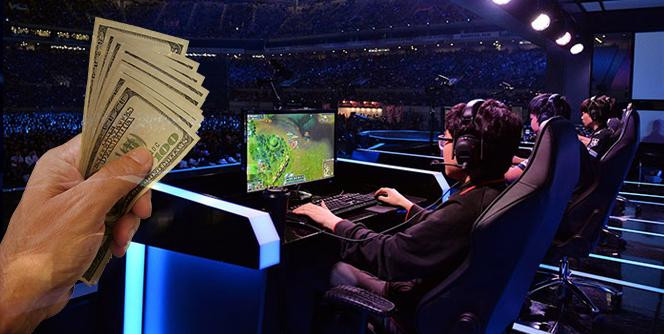The Sports betting industry has boomed in the United States following its legalization in 2018, and many see esports betting as the next big opportunity in the market. However, the esports industry faces a number of unique roadblocks and hurdles that it will need to overcome before it can reach the heights of traditional sports betting.
Before the full opportunity of esports betting can be accessed by the ecosystem, it is critical all players in the space fully understand the regulatory challenges and barriers to widespread adoption facing what is ultimately an industry still in its infancy.
Yes, Esports betting is legal in 18 states in the United States of America. Players must be 21 or older, and complete a Know Your Customer (KYC) check to play.
Esports betting is only legal in 18 states due to the complications of regulations. Each state has different regulations around betting and what is allowed, therefore, issues around integrity and age of participants for example are all roadblocks to legalising esports betting.
However, this is where our first challenge arises in the esports betting industry. As Daily Fantasy Sports (DFS) has exploded in the last few years, esports has also become available on DFS markets. However, as DFS is known as a game of skill and not chance, the legal age to participate is only 18, and most states in the US allow DFS. But where does betting become a game of skill?
Darius Gambino is a Partner at Saul Ewing, and has led the charge to legalize esports betting in recent years. He said, “Most states consider fantasy sports betting to be a game of skill, as opposed to a game of chance. In which case it falls under a different set of regulations, or it doesn't fall under what they have classified as gambling. You know, win or loss outcome is gambling. That's a game of chance. It's 50 50. One team's going to win. The other one's going to lose. With daily fantasy sports, you're betting on things like how many kills a professional player is going to get in a match.
That's the difference there, and because of that there is a difference in the law, you don't have to be 21 to engage in DFS betting. You only have to be 18 in most states. I think that's one of those areas where there has been concern expressed by different contingents. 18 is old enough to fully comprehend that DFS is very similar in concept to gambling.”
Another issue that esports sees more than traditional sports is the knowledge needed to correctly predict the market, and value the odds at the correct prices. Esports is regularly changing, with teams, metas, and even complete titles updating monthly. This unpredictability further complicates the task of setting correct lines and requires specific esports knowledge.
Each esports game also has its own schedule and a different number of events depending on if it is a franchise league, open play, or several other formats. For example, it’s extremely easy to bet on Valorant as a newcomer due to there being only a few large-scale tournaments which are available to bet on. However, with Counter-Strike 2, you can bet on everything down to the second or even third tier of tournaments. This makes it hard for a newcomer to understand which matches are high stakes, and which they should be engaging with.
This means that the opportunity for adding new titles to esports betting markets largely relies on the game publishers themselves, as it has to be clear which matches are AAA blockbusters, and which are not to that level. Having regular major league tournaments helps with this, as well as a franchised league system.
While it is much less common in 2024, there are famous examples of match-fixing that spread further than the esports community. One of the most notable examples is a professional Counter-Strike: Global Offensive match in 2014 between iBUYPOWER and NetCodeGuides.com. The iBUYPOWER team purposefully lost this match to win money on bets placed with CS:GO Skins. They were later banned from competing, and this brought CS:GO Skin betting into the spotlight.
However, match-fixing is still an issue, with professional CS2 player Erkhan “gokushima” Bagynanov most recently banned in April 2024 for a match-fixing offense.
Problem gambling is also a big potential issue in the esports betting industry, with the average bettor being younger than that of a traditional sports fan. However, if marketing is done responsibly, this becomes less of an issue. For example, websites such as Rivalry and Thunderpick use influencers to push sign-ups to their website. However, any bet slips or predictions that they post either have no monetary stake attached, or it’s very small, showing that betting can be fun without having to use massive stakes.
Felicia Grondin, Executive Director for the Council on Compulsive Gambling of New Jersey told Esports Illustrated that, as for unregulated sites “they don't necessarily play by the same marketing rules. So they might use phrases like free money, zero risk, etc. Companies that are regulated have restrictions and parameters that they have to abide by.
So there's more of an opportunity for kids to to hop on and to gamble as there’s less restrictions.”
There are a ton of resources available to help which continue to improve each and every day. For example, most esports betting sites now have predictive tools which can see if a player is falling into problem gambling, and step in to ask if they need help, or stop them without question.
For esports betting to reach the popularity that traditional sports betting has, the industry will need to overcome these challenges. However, there is a lot of work being done, and we can see where esports betting may get to in the future.
The Future of Esports Betting
Esports and casino life have become hugely popular in recent years, but what do these two worlds have in common? At the very least, the two worlds combine the thrill of competition and the chance to win big.
Esports has exploded in popularity in recent years, with more and more players taking to the limelight. Casinos, on the other hand, offer a variety of opportunities to bet even with virtual winnings from video games. This article looks at the intersection of the two worlds and what they mean for players and spectators.
Esports, or electronic sports, is a huge phenomenon today, attracting millions of viewers around the world. Tournaments of competitive games such as League of Legends and Counter-Strike fill arenas and attract major sponsorship deals. Players train for hours every day to achieve the best possible level of performance. Success in Esports requires as much dedication as in traditional sports. Many players also find additional income by participating in sponsored live casino events, which bring more excitement to their lives.
The rise of Esports has created a whole ecosystem that supports player development and career progression. Professional coaching programmes, player academies and even university scholarship programmes are more common these days. This shows how seriously esports is taken today and how it has evolved from a hobby into a real career path for many talented players. At the same time, esports has developed an extensive support network around it, including managers, psychologists and nutritionists, just like traditional sports.
The rise of esports has also seen the emergence of a new profession: esports commentators and analysts. These experts bring depth and understanding to games, helping viewers to appreciate players' skills and strategies. Their role is critical in growing and maintaining esports' popularity, making games more accessible to new viewers and providing in-depth analysis for more experienced fans. Many of these commentators are former top players who bring a unique insight into the subtleties of the game.
Casino life has its own special charm that attracts people to try their luck at different games. It offers not only entertainment but also the chance to win big money. For many players, casinos are places where they can relax and enjoy the thrill of the games. At the same time, casinos also organise tournaments, which can be highly competitive. However, players should be aware of the risks and play responsibly.
With modern technology, casinos have also expanded online, making gambling more accessible. Virtual casinos offer a wide range of games that can be played anytime and anywhere. This has brought new challenges for responsible gaming, but has also opened up new opportunities for innovative gaming formats. Games played with live dealers are particularly popular as they combine the convenience of online casinos with the social aspect of physical casinos.
The Esports and casino worlds have started to see more and more opportunities for cooperation. Many casinos sponsor esports tournaments or organise their own competitions around virtual games. This offers a unique opportunity for both parties to grow their audience and increase awareness. It is important to note that such partnerships can bring new opportunities for players and open doors to new revenue streams. In addition, a growing number of different types of casinos have started to appear on the market, using game items such as weapon skins as currency.
The collaboration between the Esports and casino worlds has also given rise to new forms of gaming and betting opportunities. Esports betting has grown significantly and many traditional betting sites have added esports sections to their services. This has created a new market that combines esports expertise with the excitement of betting. At the same time, it has sparked a debate on the fairness of the games and the need for regulatory action. The industry must balance innovation and accountability to ensure that cooperation benefits all parties and maintains the spirit of fair play.
In the future, we can expect to see more and more collaboration between the esports and casino worlds. As technology evolves, gaming experiences will also become more immersive and engaging. Players need to be ready to adapt to new trends and make the most of them. In this constantly evolving environment, those who can effectively combine their passion and strategic thinking will succeed. 2025 will see the first ever Esports Olympics. This will certainly provide an even bigger market for esports.
One of the most exciting future trends is the integration of virtual and augmented reality (VR and AR) into both esports and casino gaming. These technologies can revolutionise the gaming experience by providing more immersive and interactive environments. Imagine, for example, a VR poker tournament where players from around the world sit at the same virtual table, or an AR-enhanced esports event where spectators see real-time statistics and analysis directly from their smart glasses. These innovations not only change the gaming experience, but can also open new doors for sponsorship, marketing and player-fan interaction.
A Look at the Future
The future of esports betting is bright, but it will take time for the industry to overcome the challenges it faces. Regulators will need to find a way to balance the need for consumer protection with the desire to encourage innovation. Esports organizations and game developers will need to work together to create a more predictable and transparent environment for betting. And bettors will need to be educated about the risks involved and the importance of responsible gaming.
Despite these challenges, the esports betting market is expected to grow significantly in the coming years. As more and more people become interested in esports, the demand for esports betting will only increase. With the right approach, esports betting has the potential to become a major force in the global gambling industry.
















